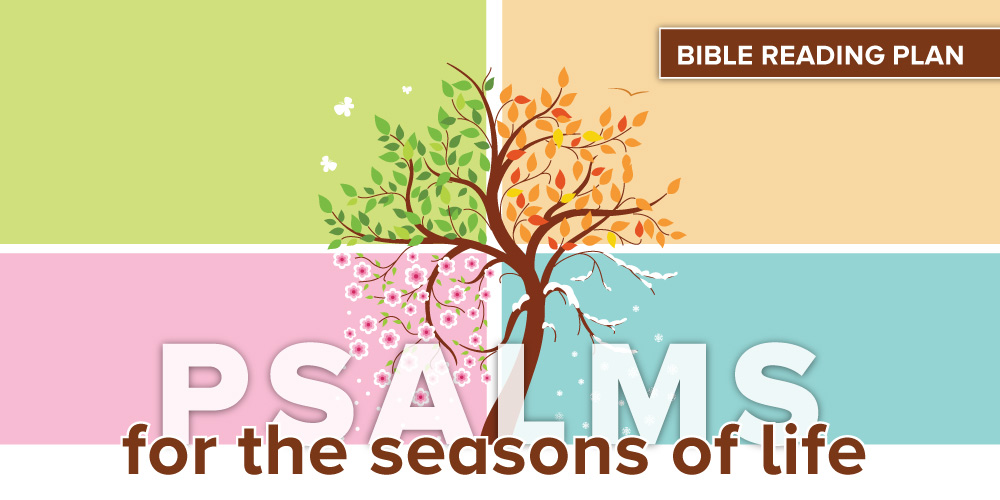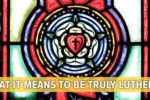 |
Jan. 29–Feb. 4
Psalm 25: “The first and last [parts of the psalm] look outward [and] deal with the psalmist’s enemies and afflictions. The middle [part looks] inward [and deals] with [his] sins and his repentance. . . . [He] prays for guidance in godly living. . . . A Christian who is sorry for his sins also has the desire to avoid sin and to live a life pleasing to God. Here the psalmist expresses his confidence that the Lord will instruct him so that he will grow in faith and in his dedication to the Lord” (PBP 1, pages 117, 119).
Psalm 26: “At first reading this psalm sounds more like the prayer of the Pharisee (Luke 18:11) than the prayer of a godly man. Doesn’t David know that ‘all have sinned’? This cry of innocence, however, is not a claim of sinless perfection, but, like Psalm 7, it protests that [he] has done nothing to deserve the hatred of his enemies. . . . A child of God is marked by his love of his Father’s dwelling place. This is, first of all, the place where we meet the Lord through the means of grace” (COP 1, pages 312, 314-315).
Psalm 27: “David begins with a triumphant assertion of God’s power in his life. Two of the great blessings resulting from salvation are joy and security. . . . David’s greatest joy comes not from his wealth or his honors but from the freedom to worship. [His] greatest desire is that the Lord would preserve his freedom to worship. . . . He pleads with the Lord not to forsake him, even though he deserves such treatment because of his sins. . . . [This psalm] is an excellent prayer in times of adversity or sickness” (COP 1, pages 319, 322, 324).
Psalm 28: “As in so many other psalms, David again prays for deliverance from his enemies. . . . When our prayers are not instantly answered in the way we expect, we sometimes think that God has not heard our prayers or that he is indifferent. But he does hear all our prayers and will answer them in the ways that are best for us. If he does not give us what we ask for, he gives us something better. . . . After praying to God for his own needs and thanking God for the blessings he has received, David does not forget to pray for the rest of God’s people” (COP 1, pages 325, 328).
Psalm 29: “[This psalm] is quite different from the psalms that surround it. In the midst of psalms of trouble, it stands as an interlude of praise. . . . In this psalm [people] and angels are admonished to worship the Lord of all creation. He rules the whole world . . . ‘In his temple all cry, “Glory!” ’ is the key line of this psalm. . . . These words draw the obvious conclusion from the power of God revealed in the storm. All his creatures should stand before him in solemn awe” (PBP 1, pages 127-129).
Psalm 30: “[This psalm is] concerned with delivery from death [and appears] to have been written during David’s old age. . . . [He] was led from overconfidence and self-reliance to dependence on the power and goodness of the Lord. . . . Through adversity we are often turned from self-confidence and complacency to a humble trust in God. . . . God’s grace is the focus of this psalm. . . . In all things, even in death, we are more than conquerors through him who loves us” (COP 1, pages 333, 338).
Feb. 5–11
Psalm 31: “This psalm is a plea for delivery. [Compared to the previous psalm], Psalm 31 expresses more acceptance of God’s will as death approaches. There is a time to pray that we will be allowed to stay here to finish our work, and there is a time to get ready to depart. . . . The special feature of this psalm that sets it apart is the fact that Jesus used the words ‘Into your hands I commit my spirit’ as his own prayer on the cross. . . . The words ‘My times are in your hand’ form a beautiful prayer for all Christians when death is near, and for every day. . . . Momentary attacks of panic give way to confidence when we recall the historical record of God’s care for his people” (COP 1, pages 341, 344, 346).
Psalm 32: “Let us hear, then, what the line of argument is here. No one is blessed except the one whose iniquities are forgiven. . . . No one is without iniquity, no one is not a child of wrath, and so he needs to have his sins forgiven. But this happens only through Christ. Therefore no one will be saved on his own, but through Christ alone. . . . This is nothing else than the wisdom of the cross of Christ . . . to understand that the Son of God was incarnate and crucified and put to death and raised for our salvation [iniquities]” (LW Vol. 10, pages 145, 148). This is the second of the seven penitential psalms. The others are 6, 38, 51, 102, 130, 143. Read Pastor Richard Lauersdorf’s article on Psalm 32.
Psalm 33: “[This psalm] reaffirms the doctrine of creation taught in Genesis chapters 1 and 2. God created the universe out of nothing, merely by speaking a command. God said, ‘Let there be,’ and it came to pass. . . . Therefore, all the people of the earth should give him the honor he deserves as Creator. . . . God continues to rule in history so that all things work for the good of his people. . . . Even though nations and many of the citizens of our land despise God’s will, God’s children continue to place all of their hope in him” (PBP 1, pages 140-141, 143).
Psalm 34: “This psalm contains a number of assurances of God’s care, which you may want to memorize for use in difficult days. Verses 8, 9, and 20 are outstanding among them. Trouble will come our way, but we will experience the Lord’s goodness if we wait patiently for him. . . . Verse 20 reminds us that believers are not without troubles but also states that God delivers us by giving us relief, by giving us patience to endure, and by calling us to himself in heaven” (COP 1, p. 368).
Psalm 35: “Psalm 35 may be treated as a summary and review of the many psalms in which David prays for help against his enemies. . . . They were his enemies without cause, and they were repaying him evil for good. In this way David’s relationship with his enemies was a type of the relationship of Christ with his enemies. . . . Jesus applied the principle of these psalms to himself. He truly suffered undeserved hatred, since he had shown nothing but love for his enemies. When we suffer undeserved hatred, let us follow the example of David and Christ and entrust our case to the Lord” (PBP 1, pages 147, 150).
Psalm 36: “David ponders an oracle (a divinely revealed truth) about the maliciousness of sinners’ rebellion against God. The heart of the problem is the corrupt nature of the sinner. The defiant sinner has no reverence for the majesty of God and no fear of his judgment. . . . Were it not for the grace of God, these verses would be a description of us all. . . . These verses sound a call to repentance to every sinner. . . . After contrasting God’s love with human sinfulness, David prays that God will continue to display his love for his people and to protect them against the wicked” (PPB 1, pages 151-163).
Feb. 12–18
Psalm 37: “To comfort those who are impatient because the wicked do evil and yet remain unpunished and very fortunate for so long . . . [the wicked] have plenty; they are the golden rich meadow in the world. Nevertheless, they must perish, yes, disappear and vanish like smoke. . . . The salvation of the wicked comes from themselves. . . . They do not need the refuge and salvation that comes from God. But the righteous . . . turn their gaze away from everything visible and tangible and trust God alone, have no salvation or refuge except that which comes from God. He does not forsake them, and he does for them what they believe and trust him to do” (LW Vol. 14, pages 211, 218, 228).
Psalm 38: “This psalm portrays most clearly the manner, words, acts, thoughts, and gestures of a truly penitent heart. . . . Our sin treads us underfoot until grace [and the forgiveness of Christ] comes, treads sin underfoot, and raises our head above it so that we become master and rule over sin, not sin over us. These are words (v. 15) of a true and strong faith, which in time of trouble lets everything else go and clings to the Word and grace of God, and does not doubt that God will hear and help him. . . . I seek no help or salvation either in myself or in anyone else, but only in [my Savior]” (LW Vol. 14, pages 156-157, 160, 163). This is the third of the seven penitential psalms. The others are 6, 32, 51, 102, 130, 143.
Psalm 39: “This psalm is a lament concerning death and the shortness of human life. . . . In spite of the fear and anguish that thoughts of death bring to him, David maintains his faith. . . . David’s prayer can also be our prayer at times when we are oppressed by fear of death. Such fears are natural even for a Christian. But when they strike us, we do well to express them to the Lord in prayer as David did so that, with his help, we may overcome them. Like David, we must confess, ‘My hope is in you, Lord’ ” (PBP 1, pages 163, 165).
Psalm 40: “[These words] would be a beautiful prayer any time a Christian experiences deliverance from death after an accident or serious illness. However, they are most meaningful as a prayer of the Messiah after his resurrection. When God the Father raised Christ from the pit of death . . . Scripture describes Jesus as one who was made ‘to be sin for us’ (2 Corinthians 5:21). When he willingly assumed the guilt of our sins, our burden became his, and he bore all the consequences of our sins. He was counted as a sinner so that we could be counted as children of God” (PBP 1, pages 167, 170)
Psalm 41: “As David experienced treachery and mockery from bitter enemies and false friends, so Christ endured the treachery of Judas and the taunts of his enemies. . . . David repeats his prayer for mercy and reaffirms his confidence in the Lord. This confidence extends not only to the preservation and lengthening of his life on earth but to an eternal presence with the Lord after death. Christ too was raised up to glory at the right hand of God. His confident prayer, ‘Into your hands I commend my spirit,’ was not in vain” (COP 1, pages 426-427).
Feb. 19–25
Psalm 42: “When we are overwhelmed by sorrow, it is helpful to ask ourselves the psalmist’s question, ‘Why are you downcast, O my soul?’ Talking to ourselves and reminding ourselves of the promises of God can help us put our sorrows into perspective . . . Like the psalmist, we may have to struggle long and repeat the same truths over and over again in order to conquer our sorrows or depressions, but like him, we should struggle and persevere until God’s light and truth guide us into his presence” (PBP 1, p. 182).
Psalm 43: “[In Psalm 43] the light of hope shines more brightly. Dark clouds of sorrow still remain because deliverance has not yet arrived, but confidence in God’s light and truth, which will lead the psalmist back to the temple, shines through more clearly. . . . Even if a literal return to God’s altar is slow in coming, the psalmist is being restored to faith and peace. He will ultimately be vindicated when he stands before God’s throne” (COP 1, p. 442).
Psalm 44: “The psalmist is perplexed that the Israelites have suffered a crushing defeat in spite of God’s promises and their faith in him. He cannot understand why this should be. . . . [The faithful] are the ones who cannot understand. . . . For the faithful among Israel, the defeats that the nation suffered were not a punishment as they were for the unbelievers. For the faithful these defeats at the hands of the heathen were persecutions they endured for the Lord’s sake. Paul reinforces this interpretation when he quotes [verse 22] in Romans 8:36 as part of a discussion of the hardships Christians endure for the faith” (PBP 1, p. 185).
Psalm 45: “The poet . . .is not writing about an ordinary king or composing a wedding march for a royal wedding in Israel. By inspiration he is writing for Christ, the messianic King, and for Christ’s wedding to his bride, the church. . . . Because the psalmist’s subject is so exciting, he is bubbling over with enthusiasm. . . . [Verse 3] was the inspiration for the familiar hymn ‘Beautiful Savior.’ Jesus’ beauty was not a physical attractiveness but a pure, sinless character and the beautiful words of truth, grace, and forgiveness which he spoke. . . . Jesus’ name and memory will be perpetuated through all generations by the believers who praise him on earth and in heaven” (COP 1, pages 452-453, 461).
Psalm 46: “Believers can remain calm even in the midst of the greatest calamities since God is their strong fortress. His help is ever-present, even at the end of the world. The upheavals described [here] may represent various kinds of calamities that strike the world throughout history [and they] may also refer to natural disasters, like earthquakes and tidal waves. . . . These verses will be fulfilled literally and completely only on the Last Day when this universe is destroyed. . . Even then believers will be secure in the hand of God. . . . The words ‘Be still’ are both a rebuke to a world in rebellion against God and an assurance of peace to his people” (COP 1, pages 464, 469).
Psalm 47: “Psalm 47 emphasizes the King’s rule over all people. The conquests of the gospel will spread throughout the world. . . . Although this king is an awesome conqueror and judge, the predominant tone of this psalm is joy. This king is no tyrant but a gracious Savior. The conquest by which the nations come under [his rule] is the spread of the gospel throughout the world. . . . We rejoice when Christ is exalted through the preaching of the gospel in every land” (PBP 1, pages 195, 196).
Psalm 48: “In the Bible the city of God is Jerusalem. . . . It was the place God chose for his temple. . . . It was the place where God’s Son, the messianic King, gave his life for us. . . . The importance of Jerusalem is not its size or its majesty but the majesty of the King who gave his life there and whose kingdom went forth from there. . . . This psalm leads us to meditate on the unfailing love of God who protects his church. This psalm increases our longing for the day on which we will enter the gates of the eternal city of our King. We tell others of its glory so that they may share the joy of living in this city” (COP 1, pages 479, 480).
Feb. 26–March 4
Psalm 49: “[The psalm is] a proverb and a riddle because it deals with one of the central problems of life that fascinates people but nevertheless remains a mystery to them, namely, the riddle of the meaning of life and the relationship of life and death. This riddle can be answered with wisdom and understanding only when it is considered in light of mankind’s relationship to God and eternity. . . . Even though riches can buy the best medical care, money cannot buy an extra day of life. . . . Only one man could pay a ransom for sin. . . . And the ransom he paid is beyond price. It is a gift of God given freely to all [rich and poor without distinction] who believe in Jesus. . . . [Verse 15] is one of the high points of the Old Testament in its clear confession of the resurrection and eternal life” (PBP 1, pages 199-202).
Psalm 50: “[What was lacking in the worship of many of the Israelites?] . . . They were not calling on God in humble recognition that they were the needy ones, but they were treating God as if he were the needy one who owed them favors for their service. . . . True sacrifices, offered in faith and thankfulness, would please and honor God. . . . We should beware of thinking that God owes us anything for our worship. . . . God wants worship that is an expression of faith and love. Only such worship is pleasing to him. Psalm 51 [will reinforce] this lesson” (COP 1, pages 498, 500, 501).
Psalm 51: “[The psalm] instructs us in the knowledge of God and of ourselves. . . . The proper subject of theology is man guilty of sin and condemned, and God the Justifier and Savior of man the sinner. . . . The forgiveness of sins depends simply on the promise which faith accepts—not on our works or merits, but on the fact that by the sting of the Law God graciously calls us back to himself so that we might acknowledge Him to be the giver of grace . . . Remember that the righteousness of God is that by which we are justified, or the gift of the forgiveness of sins. This . . . is pleasant, because it makes of God not a righteous Judge but a forgiving Father who wants to use His righteousness not to judge but to justify and absolve sinners” (LW Vol. 12, pages 310-311, 377, 392). This is the fourth of the seven penitential psalms. The others are 6, 32, 38, 102, 130, 143.
Psalm 52: “The circumstances which lie behind this psalm are described in 1 Samuel 21:1-10 and 22:6-23 . . . Doeg’s tongue was as deadly as his sword . . . David was confident that the Lord would punish Doeg in due time. . . . This psalm is a prayer against those who treacherously disregard the Eighth Commandment in order to advance themselves at the expense of others. Those who report Christians to oppressive governments, those who spread false rumors about their rivals in business, and those who cut down their neighbors with gossip are among the many examples of those who use their tongues like razors today” (COP 1, pages 516, 518, 520, 521).
Psalm 53: “Psalm 53 is a near duplicate of Psalm 14. . . . It is possible that a later inspired writer revised material originally written by David [or] that David produced both versions himself. . . . Even today it is not uncommon for an author to produce more than one version of the same basic work. Often the author will revise something he has written to make it appropriate to a new occasion. . . . Scripture itself indicates the adaptation and use of such materials by the inspired writers” (PBP 1, pages 219, 221, 222).
Psalm 54: “God’s faithfulness to his law requires that he destroy the impenitent who spurn his grace. To be true to himself, he must drive sin from his presence and destroy it. . . . When we take a stand on God’s side, our enemies are his and his enemies are ours. If we stand with God in the day of battle, we will also stand with him in the day of victory. . . . When David was delivered, he gave God freewill offerings as a spontaneous expression of his thanks rather than as an attempted repayment for favors earned. When we stand vindicated before God’s judgment seat, we will remember that our verdict of acquittal was obtained by God’s mercy, not by our merit. For this we will sing hymns of praise forever” (COP 1, p. 531).






